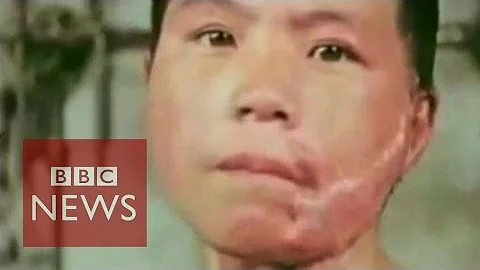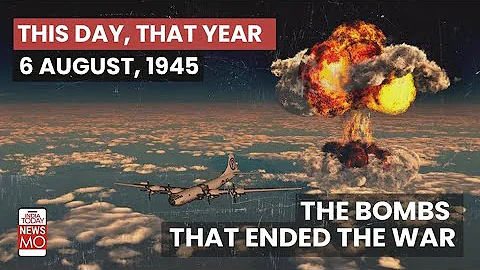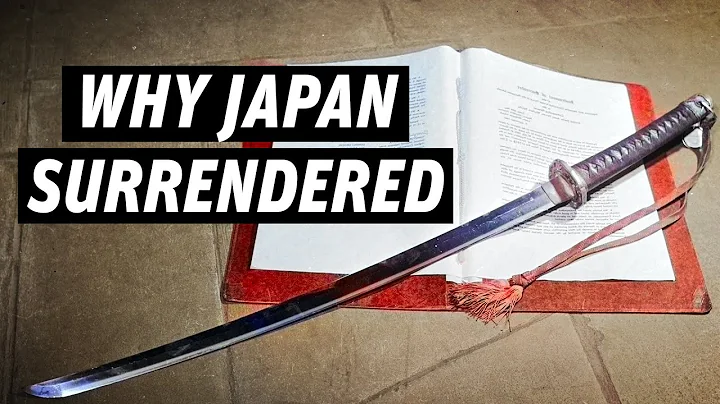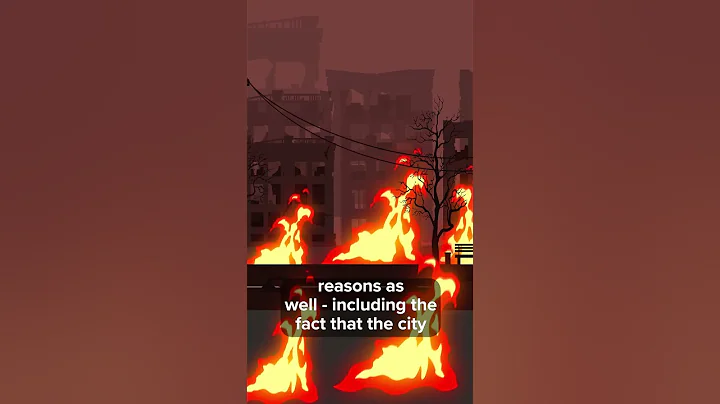Author of this article: Li Xiaotian
On August 6 and August 9, 1945, the United States dropped two atomic bombs on Japan.
Duang! Duang! !
World War II ended.
If things were reversed and Japan or Germany dropped atomic bombs on the Allies, would the result be different? Will the Axis powers be victorious? Is the world still the same as it is now?
In fact, both Japan and Germany were developing nuclear weapons during World War II. The atomic bomb is by no means a patent of the United States. In terms of technical capabilities, Japan and Germany are not inferior.

However, before the war broke out, Japan was already under economic blockade. The uranium element necessary to make the atomic bomb was unavailable due to Japan's poor domestic resources, and external purchases were also prohibited due to the blockade. Therefore, until the end of World War II, Japan's atomic bomb development was unable to advance and failed.
As for Germany, as early as 1940, the Nazis stepped up their research, development and manufacturing of nuclear weapons. The leading figure is Werner Carl Heisenberg, a famous physicist of later generations. He won the Nobel Prize in Physics as early as 1932 at the age of 31. He is a great genius. Under his leadership, research and development efforts to achieve nuclear splitting were greatly enhanced. Moreover, they also purchased heavy water in large quantities from Norway, which supported Nazi Germany at the time.
But in the end, Germany failed to develop the atomic bomb. According to historical records, when Heisenberg heard that the American atomic bomb had exploded in Japan, he was so surprised that he did not believe it was true until he heard the news on the radio.
However, Germany has not developed its own nuclear weapons, but it has a big killer like V-2 ballistic missile.
nuclear warhead + rocket, together is the way to go. Germany has not developed nuclear weapons, but its rockets are powerful, and the V-2 missile is one of the best. V-2, V refers to the abbreviation of "Vergeltungswaffe waffe (revenge weapon)" in German , which means "retaliatory weapon─2". Propelled by rockets, it is an upgraded version of V-1, which is more powerful. It is also the earliest ballistic missile put into actual combat in the world.

On September 8, 1944, Germany launched the first V-2 into London, England, and the bomb exploded in downtown London. This was the first time V-2 successfully attacked the British mainland. It caused great panic in London and had a great impact on British society and people.
If the V-2 carried nuclear weapons, Britain would probably have been annihilated. From September 6, 1944 to March 27, 1945, Germany launched a total of 3,745 V-2 missiles, of which 1,115 hit the British mainland, and 2,050 landed in Antwerp, Belgium, and Brussels on the European continent. , Liege and other places. An additional 582 are used for development, improvement and training.
In terms of battle damage, the casualties caused by the V-2 attack on Britain killed a total of 2,724 people and injured 6,476 people. The damage to the buildings was also considerable. But overall, the range of casualties was within an acceptable range, but the impact of social panic was greater, and even affected Churchill 's failure to be re-elected.
What would happen if the German V-2 development base was bombed?
This time, it was not just hypothetical, but really blown up. It happened in June 1944. A guerrilla group from Ukraine sneaked into the Denbica area of Poland occupied by the Nazis. They were ordered to investigate the German army's secret weapons base, destroy it on camera, and guide the Soviet army in bombing.

This base is the base where the German army developed V-2 ballistic missiles. Previously, Churchill had sent a top-secret telegram to Stalin, saying that the German army was testing a 5,443-kilogram heavy weapon in the Denbica area and was seeking help from the Soviets. For this reason, the Soviet Army Supreme Command sent four teams in succession to collect intelligence, but no one survived.
The fifth reconnaissance team, led by a Jew named Leonid Berenshtein (Leonid Berenshtein), took a plane to the destination for investigation.
As a result, due to the interference of German defensive artillery fire and the unsatisfactory weather and climate that day, the Berenstein team was airborne 96 kilometers away from the target.
But by some mistake, the real research and development base of the German army is nearby. And that so-called destination was actually a trap set by the German army. Therefore, none of the first four investigation teams survived.
The Berenstein team detected the V-2 base, and by sending a signal to the Soviet Red Army, guided the Soviet Red Army's bombers to blow up all the missiles in the facility, and also paid attention to preserving the base. The laboratories and production bases within the company were successfully and completely handed over to the Soviet Red Army that subsequently arrived.

About the Berenstein team, by chance, they destroyed one of the bases where the V-2 was developed, which largely delayed the German army's use of the V-2, making the V-2's damage to Britain not as great as imagined. This had a considerable impact on the entire war situation of World War II. If the German V-2s attack with all their strength, London is very likely to cause greater damage. Britain will be in dire straits, there will be internal chaos, and whether it can launch Normandy landing will become a problem.
This attack by the Berenstein team is very similar to the "Surprise Attack on the White Tigers " in Resisting U.S. Aggression and Aid Korea , and also very similar to the " Hu Family Shack Battle " in " Liaoshen Battle ", it is simply Like the hand of God, it seemed to be an accidental hit, but in fact it hit the enemy seven inches directly and accurately, unknowingly directly changing the course of the war.
Then, the incident in which Berenstein's team destroyed the V-2 development base in Denbica could be made into a wonderful movie.
"Berenstein" is such a movie, it is worth watching.

However, "Berenstein" does not simply focus on the process of destroying the V-2 development base in Denbica, but focuses on the characters and talks about Berenstein's growth and role throughout World War II. Therefore, this is a film based on characters, not events.
The entire film adopts a documentary approach, telling stories while interviewing Berenstein, who is still alive, from time to time. The male protagonist has his own history, and interviews with the characters are intertwined with the storyline, complementing each other and promoting each other. This somewhat dilutes the drama of the film's story, and also raises the audience's viewing threshold. If you know nothing about the history of World War II or the history of the Jews, if you watch this film rashly, you will probably be a little shocked and think that the film is not very good to watch.
can only say that movies are not only movies, but also historical records. If you watch this film with the attitude of wanting to understand a piece of history, your acceptance will be better.
Leonid Berenstein, a Jew, was born in 1921 in the Soviet Union, which is now Russia. After the outbreak of World War II, he joined the Soviet Red Army and became a soldier in the 3rd Company of the 223rd Artillery Regiment of the 5th Army of the Red Army. As a result, he was injured and stunned by a German bomber on the frontline position of in Kiev. When he woke up, his comrades had retreated. He found a local farmer alone and with their help escaped the Nazi roundup. Then, he walked into the jungle and joined the local Ukrainian guerrillas. He grew up with the guerrillas and survived until the war. He also listened to the call to establish the nation of Israel and moved to Israel. Therefore, his deeds have not been revealed in the Soviet Union and Russia. It was not until much later that he was discovered by an Israeli director and his deeds were adapted into a film.
Therefore, "Berenstein" looks a little strange, because on the surface it is an Israeli film, but it tells a pure story of the Soviet Union's fight against the Nazis on the Eastern Front battlefield of World War II. No matter how you look at it, it looks like A Russian film.

Back to the video, after Berenstein was knocked unconscious, he woke up and the troops had evacuated, leaving him behind enemy lines. As a Jew, the only way to survive at this time is to join the guerrillas, survive in the gaps left by the German army, and survive in the battle.
Fortunately, Berenstein survived. Moreover, he gradually grew up in the guerrillas and eventually became the supreme commander of the guerrillas he belonged to.
The paradox of history is that "Berenstein" was filmed in 2021. It tells the story of a Russian (Soviet Union) who worked as a guerrilla in Ukraine and fought side by side with Ukrainians against the Nazis, and achieved fruitful results. deeds. However, in the blink of an eye, one year later, in 2022, Russia and Ukraine are at war with each other, fighting to the death. There is no trace of the joint fighting back then.
In fact, I originally came here with the intention of watching a World War II movie related to Israel. I didn’t want to get involved in the Russo-Ukrainian war or cause any trouble. As a result, I still saw the story of a Russian fighting the Nazis in Ukraine. Faced with this situation, it is really disappointing. History, history, is so weird that it is impossible to comment.
Berenstein died in 2019. If he were still alive and facing the Russia-Ukraine war, I wonder how he would feel?

Back to the film, Berenstein's guerrillas fought completely behind the Nazis, operating in enemy-occupied areas, from western Ukraine to Poland , and then to the Czech Republic , their activities were active. figure. At the same time, it also means that they do not have any medical conditions, and as long as they are seriously injured, they will almost certainly die.
Berenstein survived and was doing better. Also because of his bravery in combat and strict discipline, he dared to argue and stick to his own opinions even if he was a political commissar, and resolutely shot the opportunists who raped civilian women. He also gained prestige and gradually became a true leader.
The main task of the guerrillas commanded by Berenstein was to attack the German army's transportation lines. They once derailed 44 German train cars during an attack.
In the Great Battle of the Dnieper River at the end of 1943, Berenstein's guerrillas played an important role in guiding the Soviet Red Army across the river south of Cherkasy. He was subsequently promoted to commander of the guerrillas, and in the spring of 1944, when the Soviet Red Army set out to liberate Eastern Europe beyond its homeland, he was sent as an advance unit to eastern Poland.
and above, this is probably the main story to be told in the first part of "Berenstein". Next, it is time to complete the legendary mission of destroying the V-2 ballistic missile. As for what happened next, Berenstein did not talk about his greater achievements in liberating the Czech Republic. The bombing of the V-2 came to an abrupt end.

As mentioned before, the guerrilla group led by Berenstein was originally mistakenly placed 96 kilometers away from the target. Unexpectedly, the real target is exactly in this wrong place.
However, their few guns alone are far from being able to complete the task.
At this time, they discovered that there was a concentration camp that was not too big, and the prisoners in it were about to be massacred. Berenstein decided to rescue the captured personnel first. This was something that had nothing to do with their mission. Some team members expressed strong opposition because of this, fearing that if they exposed themselves too early, they would be in danger of being attacked by the German army.
But Berenstein insisted on his opinion and finally relied on surprise to eliminate the German defenders in one fell swoop and liberate the concentration camp. The German army probably did not expect that a military force would suddenly appear in such a rear area.
Although the liberation of the concentration camp brought sacrifices to his team, the advantage was that more detainees were willing to join the guerrillas, and the team increased instead of decreasing. (Through this method of continuous liberation, the number of guerrillas commanded by Berenstein reached 5,000 at its peak.)
Specifically speaking of the guerrillas' reconnaissance of the V-2 base, they actually did not encounter much resistance.On the contrary, it was like God's help. Even more fortunately, they also met a French expert who had escaped from the base. The Frenchman was recruited to do research here, but he was overwhelmed and escaped. If you don't encounter guerrillas, there is a high probability that you will be caught by the Nazis.

With the information from insiders and some external investigations, the intelligence will be ready quickly.
In this way, with the blessing of luck, Berenstein successfully guided the Soviet bombing and destroyed the V-2 development base in the Denbica area.
However, the German research and development base was not only Denbica, but also Namon was not discovered, which eventually led to the bombing of the British mainland, but the intensity had dropped a lot, and the sacrifice was not that great. Unfortunately at night Lucky for you. Among them, Berenstein definitely played a big role. If Denbica and Namon and other places work together to develop and produce, then the bombing that Britain will encounter will be much stronger, and the second process is very likely to be blocked. Change.
Generally speaking, "Berenstein" is a bit dull as a film. The stormy waves are hidden under the lens, and the visibility is slightly poor. Many key shots need to be supplemented. But as long as you imagine the nine-death life that the male protagonist has experienced, he said that he faced many difficulties, and you will immediately feel how difficult it is for him to survive.
As a guerrilla, he not only had to face encirclement and suppression by the German army, but also watched the villagers who had helped them be massacred by the group and was helpless. At the same time, they also have to face the political pressure brought by the political commissar, as well as the blind command of external commanders, as well as the discipline problems of the team members.
As a Jew, he not only had to face the butcher knife of the Nazis, but also faced the dilemma of anti-Semitism from within. He had clearly made meritorious deeds and could win medals, but he was suppressed by the anti-Semitic people in power and suffered discrimination.

In the end, to summarize, "Berenstein" is a story filmed by Israelis about a Soviet Red Army soldier who joined the guerrillas in Ukraine to fight against the Nazis. Overall, the story told is quite thrilling and touching.
As for how he "surprised the White Tiger Hall", it actually depended on luck, luck and accidental collision. It's not like the "surprise attack on the White Tiger Regiment", but more like the "Hu family shack battle" in the "Battle of Liaoshen". This battle accidentally broke into the headquarters of the supreme commander of the national army, Liao Yaoxiang, and caused trouble in one fell swoop. Without the command of the Nationalist Army, the originally well-organized Nationalist Army suddenly lost its brain and became completely chaotic, and was then surrounded and annihilated by the Communist Army.
In 2022, watching a film like "Berenstein" really feels a bit inconsistent, almost like a joke. Russia (Soviet Union), Ukraine, and the Nazis, these elements are intertwined, watching it , looking at the news again, I really don’t know what day it is. well!
(pictures from the Internet, copyright belongs to the original author)





















